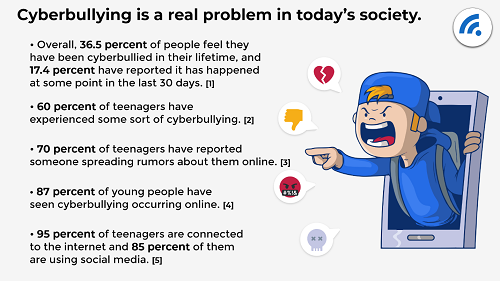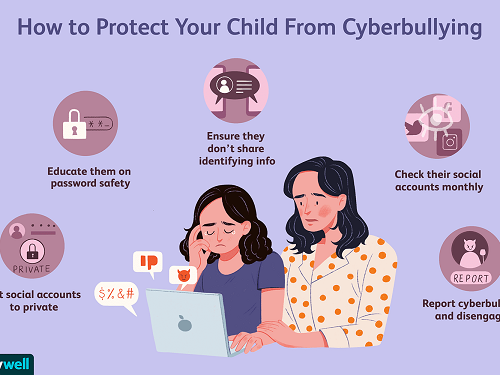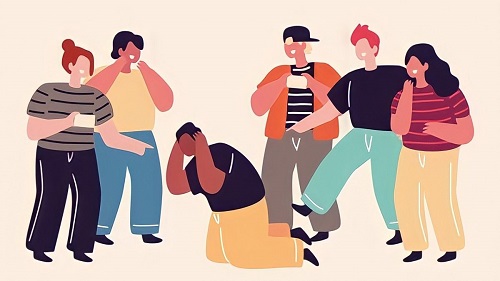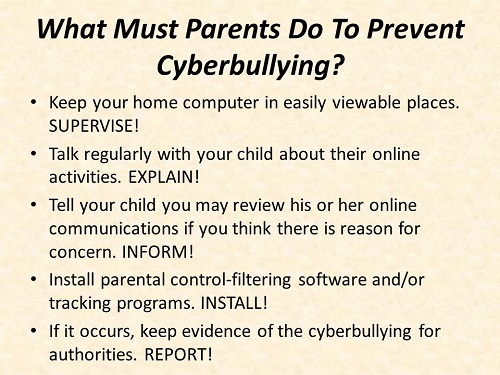Effects of Cyberbullying – Effects of Cyberbullying on Children

Cyberbullying is an extremely significant problem that affects not only the young victims but also their families, the bully, and bystanders. The victim of cyberbullying, however, may encounter a multitude of emotional problems that have a negative impact on their social and academic performance as well as their general mental health.
You may not have personally faced cyberbullying as parents today. It would be difficult to understand how some letters on a computer screen might cause such agony. After all, it seems like bullying has always been a problem in schools and on playgrounds. When you were in school, perhaps you witnessed or were the victim of bullying.
Perhaps you believe that bullying is a natural component of school life.
Considering that victims of real-world bullying have a harder time escaping their tormentors than victims of cyberbullying, you might also believe that real-world bullying is significantly worse than cyberbullying. However, a victim of cyberbullying only needs to turn off the computer or block the bully on a social media platform.
Sadly, it’s not quite that easy. And while the consequences of physical bullying should not be discounted, the consequences of cyberbullying can actually be much more severe. It is your responsibility as parents to comprehend the true effects of cyberbullying, to spot a change in your child’s behavior as a result of cyberbullying, and to figure out how to support your child.
A child may experience physical and mental harm as a result of bullying of any kind. Children who are targets may face a variety of difficulties, including anxiety, fear, depression, low self-esteem, behavioral problems, and academic difficulties. However, cyberbullying might be especially harmful. There could be a number of causes for this. Cyberbullying, for instance, can happen at any time, day or night, and is often carried out by anonymous sources, in contrast to traditional bullying, which is frequently restricted to schools and known bullies. As a result, it becomes more relentless and frequently more cruel.
While cyberbullying can occur in an open digital environment, such as a social media post, it can also occur in the form of private messages, leaving some children to manage this secret and its impact on them on their own.
Knowing all of the consequences of cyberbullying can not only help you support a child you know is being victimized, but it can also make you more alert to warning signs that might warrant conversation and concern.
Behavior modifications brought on by the effects of cyberbullying
The following behavioral alterations, which can be potent signs of cyberbullying, may not be immediately noticeable at first but may become apparent over time.
Dropping grades; Losing interest in activities they used to enjoy; Skipping school or expressing a desire to skip school; Becoming less social; Avoiding friends or social gatherings; Spending more time alone in their room than usual; Finding it difficult to focus on schoolwork; Appearing angry when looking at their phone, tablet, or computer; Hiding their phone or computer screen from view; Avoiding using their p discussing suicide.
If you believe that some of these behavioral alterations, like suicidal thoughts, seem a bit severe, you should be aware that there is a strong correlation between bullying and suicide.
Bullying might not always be the only factor in a situation. It’s possible that the child is already depressed or anxious as a result of issues at home or a past trauma.
But a recent study found that those who experience cyberbullying are twice as likely to attempt suicide or harm themselves. Additionally, according to recent statistics, 59% of American teenagers have experienced online bullying or harassment, and over 90% think that it is a significant issue for people their age.
Even more concerning, recent research indicates that teen suicide attempts have almost doubled since 2008.
In addition to mental health problems, elevated stress and anxiety, depression, acting out violently, and low self-esteem are other effects of cyberbullying.
Even if the bullying has stopped, cyberbullying can have long-lasting emotional effects.
Cyberbullying’s aftereffects can cause long-lasting feelings of embarrassment. Online bullying seems more enduring, particularly when it takes the form of persistent social media posts. It may result in excruciatingly distressing and exposed feelings.
Other people who are concerned about cyberbullying may exclude the victims if they continue to be friends with them, which is another negative effect of cyberbullying. As a result, the victim is left alone and rejected at school and at home with no one to turn to.
It comes as no surprise that anger is one of the side effects of cyberbullying. Anger frequently results from the range of emotions that a victim may be experiencing. As evidenced by instances of school shootings and other acts of aggression committed by bullied victims who couldn’t take it anymore, some kids may even start hatching revenge plans.
Because victims of cyberbullying frequently feel helpless to stop what is happening, the act of retaliation also serves as a means for a child to regain some sense of power.
Why Some Kids Experience Cyberbullying
Effects of cyberbullying on the Mind
Cyberbullying is a huge stressor in a young person’s life, which is not surprising. According to study, 32% of children who are the targets of cyberbullying say they have experienced at least one stress symptom.
In addition to being upset, people could also feel injured, humiliated, and even fear for their safety. They might even attribute the cyberbullying to themselves.
Do not be reluctant to contact your child’s healthcare professional for an assessment and help if you observe a change in your child’s mood.
Effects of Cyberbullying – Humiliation
Online bullying seems everlasting since it takes place in cyberspace. Children are aware that once something exists, it does so permanently. They might experience overwhelming, humiliation, and exposure.
When cyberbullying takes place, the offensive posts, messages, or texts can be distributed widely. The sheer number of people who are aware of the bullying can cause extremely strong feelings of humiliation and isolation.
Children who are the victims of cyberbullying may experience exclusion and bullying at school. Thus, they frequently experience loneliness and isolation. 1 Because friends are so important at this age, going through this experience can be especially painful. Bullying can increase when children lack friends.
Parents occasionally advise turning off the computer or the phone when there is cyberbullying. However, many youngsters view using these gadgets as their primary method of social interaction.
They may feel more isolated if you turn them off because doing so frequently means severing their connection to the outside world.
7 Signs Your Friendship Is Bully-Proof
Many cyberbullying victims will become upset about what is happening to them. Actually, studies show that the most frequent reaction to cyberbullying is rage (followed by being upset and worried).
Some abused children may even plan their vengeance and act in retaliation. This strategy is risky not only because of the trouble they might get into, but also because it might keep them stuck in the bully-victim cycle.
Even though it’s always preferable to forgive bullies rather than exact revenge, this is frequently easier said than done.
It might be beneficial for your child to speak with a counselor or therapist who can show them how to channel their anger in constructive ways if they appear to be extremely angry about cyberbullying.
Effects of Cyberbullying – Powerlessness
It can be challenging for cyberbullying victims to feel secure. They might experience weakness and helplessness. These emotions frequently come to the surface because the online bullying can enter their home at any time of day using a computer or a mobile device. They are no longer able to flee to a safe haven.
A victim may believe that cyberbullying is prevalent everywhere. This knowledge may also increase feelings of fear because bullies can remain anonymous.
Even though some cyberbullies pick people they know and have no issue identifying themselves, sometimes the youngsters who are targeted may not know who is causing them harm.
Cyberbullies who Prey on Known Individuals
Effects of cyberbullying on the Mind
Victims of persistent cyberbullying could view the world in a different way than other people. For many people, life can seem pointless and without purpose.
They might stop taking an interest in activities they once found enjoyable and spend less time connecting with friends and family. Additionally, despair and suicidal thoughts may appear on occasion.
Both anxiety and depression
Cyberbullying victims may develop anxiety, sadness, and other stress-related illnesses. Their sentiments of happiness and joy can be stolen by the additional stress of dealing with cyberbullying on a regular basis.
Additionally, it could make you feel more anxious and alone.
Cyberbullying can also undermine one’s sense of self-worth and self-confidence, which can exacerbate melancholy and anxiety.
The idea that rising levels of cyberbullying cause rising levels of depression has constantly been substantiated by research. In fact, according to one study, 93% of people who experienced cyberbullying said they felt depressed, helpless, and hopeless.
Low confidence

Cyberbullying frequently focuses on the areas where victims already feel most exposed. For instance, a youngster who harbors insecurities about a birthmark can experience bullying because of it.
Online bullying can affect one’s self-esteem even if that is not the case. Bullying victims may start to experience profound unhappiness with whom they are. As a result, people could start to question their value and worth.
Cyberbullying may result in psychological maladjustment, decreased well-being, and eventually low self-esteem, according to researchers, because young people have a strong psychological urge to belong to and be accepted by a peer group.
Children who experience cyberbullying may become disinterested in learning. They frequently have substantially greater absence rates than youngsters who aren’t tormented as a result. They might skip class to avoid having to deal with the youngsters who are cyberbullying them or because the messages circulated online have made them feel ashamed and degraded.
Their ability to focus or study may diminish, which could also affect their grades. Additionally, children can lose interest in continuing their education after high school or decide to drop out.
Intentions to Self-Harm and Suicide
Targets of cyberbullying occasionally hurt themselves as a way of coping with their strong emotions. For instance, some people may cut or burn themselves as a form of self-harm. Bullying and self-harm are, in fact, frequently linked by research.
The risk of suicide is also increased by cyberbullying. Kids who are bullied by their peers via text messages, instant messages, social media, or apps frequently start to believe that there is no hope and that the only way to get rid of the pain is to commit suicide.
Call the National Suicide Prevention Lifeline at 988 for support and assistance from a qualified counselor if your child is contemplating suicide.
Call 911 if you or a loved one is in immediate danger.
As a result, they might have fantasies about passing away to get away
Effects of Cyberbullying on Behavior
Children who are bullied online might exhibit the same behavioural alterations as children who are bullied in more conventional ways. They might lose interest in activities or behave secretively, for instance.
Kids occasionally even display more significant behavioral changes in extreme situations or when cyberbullying is prolonged. These may consist of:
Using alcohol or drugs: Online bullying of children increases their risk of substance abuse. In fact, a study found that victims of cyberbullying were 2.5 times more likely than their peers to use marijuana or binge drink.
School absences: When children experience cyberbullying, the thought of attending class may be too much for them to handle. As a result, it’s not unusual for them to skip class or act in a way that gets them suspended. Cyberbullied individuals reported two or more suspensions or detentions in the year prior, according to one survey.
Possessing a weapon: What’s more alarming is that children who experience cyberbullying are more likely to carry a weapon to school. In fact, compared to their peers, those who had been the targets of cyberbullying were eight times more likely to have brought a weapon to school in the previous 30 days.
Effects of cyberbullying on the body

Being the subject of cyberbullies may be devastating, especially if many children are taking part in it.
Feelings of exhaustion and stress can appear physically in conditions like:
Digestive system disorders Bullying-related stress can also result in or make stomach upset, tummy pain, and stomach ulcers. Children may also experience frequent diarrhoea, vomiting, and nausea. 1 Unhealthy eating: Children who are subjected to cyberbullying may affect their eating patterns, missing meals or engaging in binge eating. They look to their eating habits as something they can control since they feel like their lives are out of control. These initiatives could develop into a severe eating disorder, especially if the bullying affected the victim’s perception of her body.
A person’s sleep patterns may be affected by experiencing cyberbullying. They could experience nightmares, excessive sleeping, or insomnia as their sleep problems.
It’s crucial to consult your child’s doctor if you notice any changes in your child’s eating or sleeping patterns or if they seem to be having more physical problems than usual. These might be symptoms of more serious problems that require analysis.
How Pervasive Is Online Bullying?
A word From Verywell on the Effects of Cyberbullying
It’s crucial to support your child in taking action to stop the abuse if they are a victim of cyberbullying. This could entail informing social media platforms, school administrators, and even the police about cyberbullying. Make sure you do everything in your power to put an end to the suffering, including learning about the regulations related to cyberbullying.
Don’t ignore your child’s feelings in the interim. Make every effort to give them a sense of empowerment. Maintain daily contact with them and pay close attention to any shifts in their behavior and mood. If you notice any changes, consult a medical expert right away.
Having a counselor or therapist who teaches them how to deal with and respond to cyberbullying in healthy ways can be helpful for every person who has been the victim of it. Your child can weather this storm while building resilience and perseverance by learning effective coping techniques.
How can parents stop online bullying?

Unfortunately, there isn’t a simple, universal fix for the cyberbullying issue. However, as parents, you can at least be there for your kids. It is very likely that your child won’t be honest about any cyberbullying incidents they may be dealing with.
However, if you notice any of the warning signs listed above, spend some time with your child and make an effort to get them to talk about any issues they may be facing at home or at school. You can help your child feel less alone by showing them that you care and that you understand what they are going through.
A child will understandably not be very receptive to that line of reasoning, but it is not your only option. Making every effort to change the privacy settings on your child’s social media and chat accounts as well as blocking any known online bullies is the first step.
Next, compile all proof of cyberbullying, taking screenshots as necessary since many posts may be deleted. Because cyberbullying frequently breaches terms of service, report instances of it to the administrators of the app or site.
You can also speak with the administration of the school using your proof. The school administrators should be informed of the actions even though the occurrences might not always take place at school. Numerous schools have stringent cyberbullying and anti-bullying rules.
You can also report cyberbullying to your local police force if it involves any threats of actual physical harm.
Lastly, consider how you might aid in your child’s emotional recovery. You might need to seek the help of a mental health expert. Do not ignore the impacts of cyberbullying or assume they will go away once it ends. If the cyberbullying was serious, it might take more than just your encouraging words and sound advise to undo the harm that has been done. The repercussions might persist for a very long time.
Many parental controls are included in today’s technology to help protect children from improper or hazardous online content. Additionally, you may make use of third-party applications like Kaspersky Safe Kids, which protects users from harmful information and also gives them the option to establish screen time restrictions, keep tabs on their online activities, or locate them using GPS.
The digital environment can be large and unforgiving. It is stuffed with adult material that curious kids can find all too easily. You can easily prevent your kids from unintentionally (or intentionally) viewing adult content with Kaspersky Safe Kids while also making sure they don’t spend an unhealthy amount of time online.
